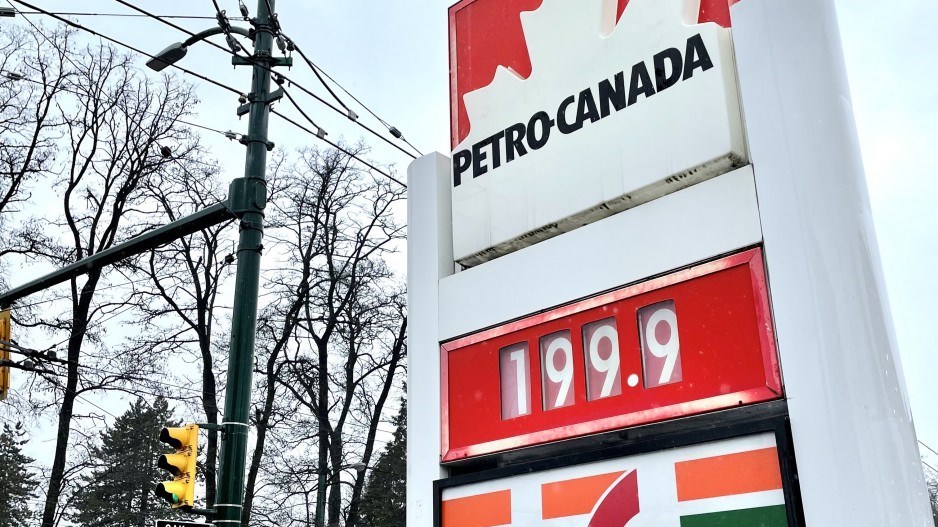A three-cent increase in carbon taxes that took effect April 1, a seasonal switch to summer blend gasoline, and generally strong global oil prices combined to push prices at the pump by several cents overnight in Metro Vancouver.
And British Columbians can expect gasoline prices to remain high this summer, despite the fact the expanded Trans Mountain pipeline is expected to be in operation this summer, according to Andrew Botterill, national leader of energy and chemicals for Deloitte Canada.
According to GasWizard, gasoline prices in Metro Vancouver were expected to increase by about five cents per litre today, and another two cents per litre Friday.
In its Energy, Oil and Gas Price Forecast, Deloitte Canada notes that OPEC has been maintaining production levels in a way that has stabilized oil prices at around US$80 per barrel, which is good for Alberta’s oil and gas sector. Over the last week, prices have jumped by about US$5 per barrel to US$85.
“With OPEC continuing to cut, we see consumption and relatively strong prices out in the future,” Botterill told BIV News. “I think that’s giving a lot of companies some good investment cases here.”
So might the expansion of the Trans Mountain pipeline, which was previously expected to be in production by now. But the completion date has been pushed back to the end of the second quarter of 2024. Trans Mountain is now aiming for May 1 as a commercial in-service date.
The pipeline is being twinned to boost its capacity from 300,000 barrels of oil per day (bpd) to 890,000 bpd. As it is a batched pipeline, it can move a variety of products, from diluted bitumen to light oil and refined fuels, like gasoline and diesel.
Some analysts have suggested the expanded pipeline could reduce wholesale gasoline and diesel prices for British Columbians, since the expanded capacity might mean more refined fuels from Alberta could move on the expanded line. Botterill is not in that camp.
“I think the intention of the pipeline was always to export, more than anything,” he said.
With oil prices expected to remain strong, he said Canadians should not expect much of a break on high gasoline prices this summer.
Gasoline prices generally increase in the summer because refiners switch to a summer blend, which is slightly more costly to produce, and because the demand for gasoline simply goes up in summer, as Canadians start travelling more.
“We’re heading into summer driving season here, with an upward trending oil price, relatively firm market, and expectation of some pretty firm demand, and higher carbon prices,” Botterill said. “So it could be an expensive summer at the pump for us all.”
The expansion should be good for Alberta oil producers, however, as the expanded pipeline and expanded Westridge Marine Terminal will allow Alberta producers to access more markets other than the American Midwest and American Gulf Coast.
That limitation has resulted in Alberta oil generally selling at a discount to West Texas Intermediate. Once Alberta producers have expanded access to other markets, such as California and Asia, a tightening of price differentials can be expected.
“In North America, the long-awaited Trans Mountain Expansion project is poised to provide a new outlet for Canadian oil to expand into developed markets on the U.S. West Coast and in Asia,” the Deloitte forecast notes.
“To take advantage of the additional market access, several oil sands operators have stated they will strategically increase their drilling activities and capital deployment in alignment with the expected improvement in WCS pricing with the startup of the pipeline.
“As the pipeline moves closer to calling on producers for line fill, the tightening between Western Canadian Select (WCS) and West Texas Intermediate (WTI) in the short term is coming into sharper view.”
“For much of their entire lives, we’ve been sending all of our oil south, and I think this is going to give some opportunity to give those producers an extra sale point,” Botterill said. “I think some producers are going to find some real opportunity in the market in that, and I think, by doing that, what we’re going to create is that little bit of tightness that I talked about.”
When the expansion was first being considered and approved, it was expected that most of the additional exports would be going to Asia. But California may turn out to be a significant new market for Alberta oil as well, owning to the fact that California refineries have limited crude pipeline access. California currently imports a lot of its crude oil by tanker from places like Ecuador, Saudi Arabia, Iraq and Columbia.



